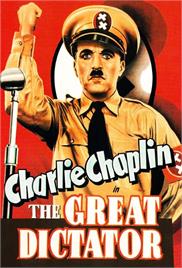Be Careful of Fake Websites. Always use HindiMovies.to domain & Join our Telegram Channel for Latest Updates.

Likes: 36
Views: 6.1K
Twenty years after the end of WWI in which the nation of Tomainia was on the losing side, Adenoid Hynkel has risen to power as the ruthless dictator of the country. He believes in a pure Aryan state, and the decimation of the Jews. This situation is unknown to a simple Jewish-Tomainian barber who has since been hospitalized the result of a WWI battle. Upon his release, the barber, who had been suffering from memory loss about the war, is shown the new persecuted life of the Jews by many living in the Jewish ghetto, including a washerwoman named Hannah, with whom he begins a relationship. The barber is ultimately spared such persecution by Commander Schultz, who he saved in that WWI battle. The lives of all Jews in Tomainia are eventually spared with a policy shift by Hynkel himself, who is doing so for ulterior motives. But those motives include a want for world domination, starting with the invasion of neighboring Osterlich, which may be threatened by Benzino Napaloni, the dictator of neighboring Bacteria. Ultimately Schultz, who has turned traitor against Hynkel’s regime, and the barber, may be able to join forces to take control of the situation, they using Schultz’s inside knowledge of the workings of the regime and the barber’s uncanny resemblance to one of those in power.
Duration: 125 min
Released: 1941
IMDb Rating: 8.5/10 (101,756 Votes)
Genre: Comedy, Drama, Dubbed Movies, War
Stars: Charles Chaplin, Jack Oakie, Reginald Gardiner, Henry Daniell
Directors: Charles Chaplin
Writers: Charles Chaplin
Year: 1940
The Great Dictator is a classic 1940 film that combines comedy, drama, and political satire to deliver a powerful message during a turbulent time in world history. Directed, written, and starring the legendary Charles Chaplin, this movie stands as one of his most iconic works and remains relevant even decades after its release.
Plot Summary:
The film is set against the backdrop of the rise of fascism in Europe during the late 1930s. Charles Chaplin takes on a dual role, portraying both a Jewish barber and Adenoid Hynkel, the ruthless dictator of Tomainia—a clear parody of Adolf Hitler and Nazi Germany. The Jewish barber is a humble, kind-hearted man who, after suffering from amnesia, returns to his home only to find himself caught in the oppression and cruelty brought about by Hynkel’s regime.
The story unfolds as the barber inadvertently becomes involved in the political tensions and the plight of his oppressed community. Chaplin cleverly uses humor, slapstick comedy, and biting satire to expose the dangers of fascism, hatred, and intolerance. The film culminates in an iconic speech delivered by Chaplin’s character, where he breaks the fourth wall to passionately advocate for peace, humanity, and democracy.
Main Actors:
Additional cast includes actors who portray the various residents of Tomainia and characters representing other political figures of the time, amplifying the satirical and dramatic tension in the film.
Director and Writer:
Charles Chaplin himself directed and wrote The Great Dictator. This was a courageous endeavor, considering the political climate of the time and the boldness of Chaplin’s critique of authoritarian regimes. The script masterfully blends comedy and poignant commentary, a hallmark of Chaplin’s work throughout his career.
Significance and Reception:
Released during the early years of World War II, The Great Dictator marked Chaplin’s first true talking picture — a departure from his famous silent films. The movie's fearless satire of Adolf Hitler and fascism was groundbreaking and controversial. It took a clear political stance against the atrocities plaguing Europe and used humor to inspire audiences to reflect on the importance of freedom and humanity.
While some contemporary critics were unsure of mixing comedy with such grave topics, the film was widely praised for its creativity and moral message. Chaplin’s final speech remains one of the most memorable moments in film history, often cited for its heartfelt appeal and universal call for peace.
Technical and Artistic Highlights:
Legacy:
The Great Dictator is more than just a comedy; it is a bold artistic statement. It helped pave the way for politically-engaged cinema and demonstrated the power of film as a medium for social change. Chaplin’s fearless approach humanized victims of tyranny and challenged viewers worldwide to resist oppression in all forms.
This film continues to be studied and appreciated for its artistry, historical importance, and its compelling advocacy for human rights and dignity.
For anyone interested in classic Hollywood cinema, political satire, or the history of the World War II era, The Great Dictator is a must-watch film that eloquently combines humor with profound social commentary.